Wednesday, January 15th, 2020 by Julian Karsunky
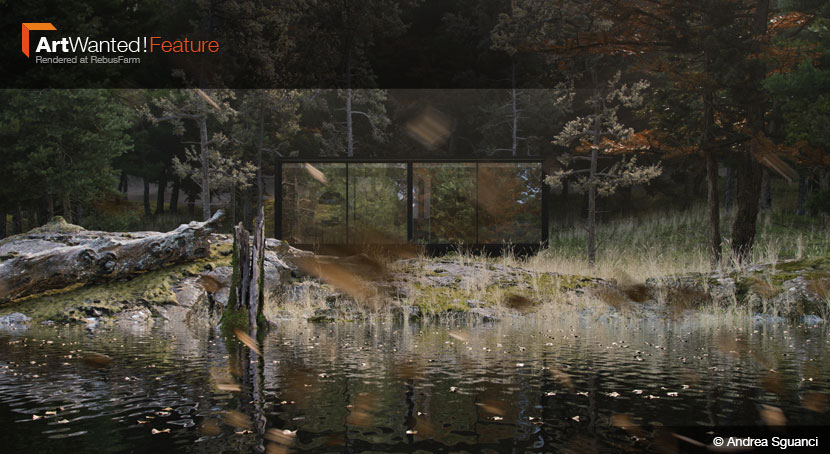
Humankind has looked to nature in search of inspiration and solutions since the dawn of time. In architecture and design, biomimicry is particularly prevalent, which is why environments are an integral part of archviz work. Italian 3D artist Andrea Sguanci keeps exploring the everlasting mutual influence between nature and architecture through his personal work, honing his skills in the process.
Join us, as we take a look beneath the undergrowth and explore the age-old fascination for natural environments through an archviz lense.
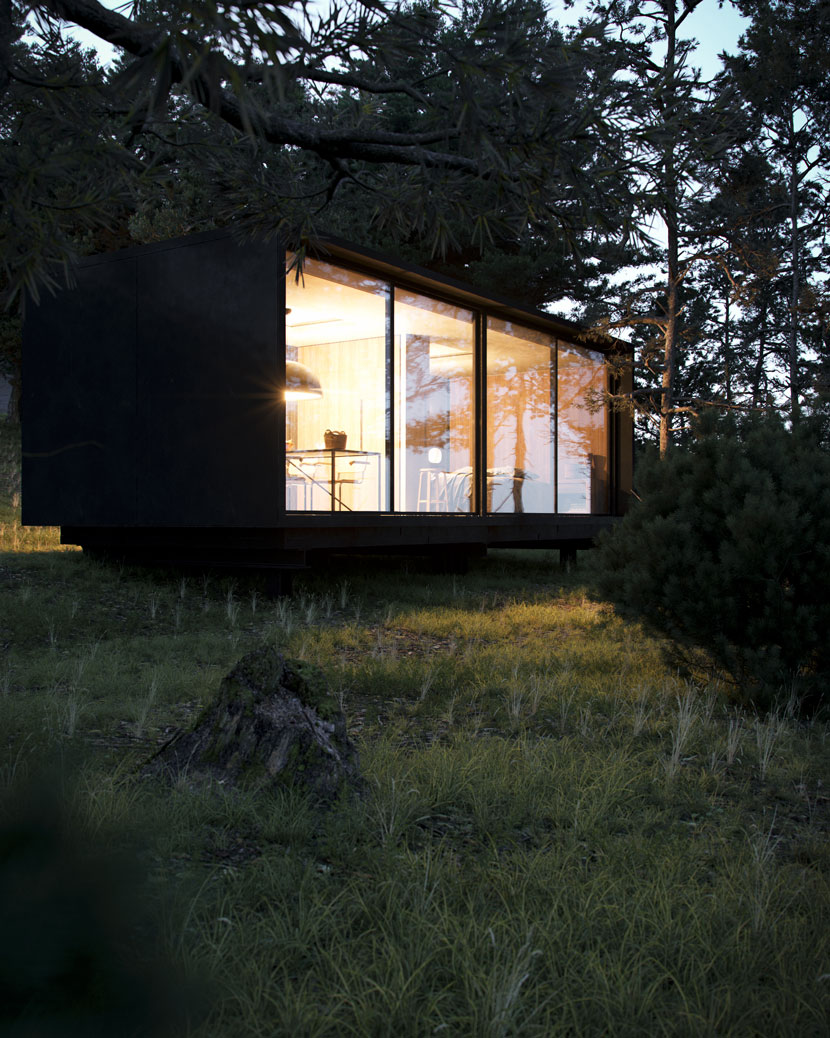 A study in realistic environments, Andrea Sguanci’s ‘K11 house’ explores the relation between architecture and nature.
A study in realistic environments, Andrea Sguanci’s ‘K11 house’ explores the relation between architecture and nature.
Hi Andrea, thanks for joining us. To start things off, please introduce yourself to our readers!
Hi, my name is Andrea Sguanci, I'm a 30-years-old 3D artist from Milan, Italy, specializing in the creation of full CG environments for real estate and architecture. Currently, I’m working as lead 3D artist of the archviz team at TECMA Solutions S.p.a.
Let’s take a short trip into the past: do you still recall when and how you first consciously encountered CGI?
That would’ve been during my first year of my design studies, around 2010. Upon first seeing renders made in 3ds Max and V-Ray, I immediately was intrigued and wanted to learn more about that.
When and why did you then decide to pursuit a professional career as a 3D artist?
Ever since my studies in architecture, which I eventually abandoned. I’ve always liked rendering, and over time it became increasingly clearer to me that this was what I wanted to do for a living.
What training or education do you have?
I soon recognized the internet as a valuable training resource, and consequently, most of my knowledge came from friends in the Italian 3D community. Of course, I've also learned a lot through relevant international forums such as Treddi and Evermotion.
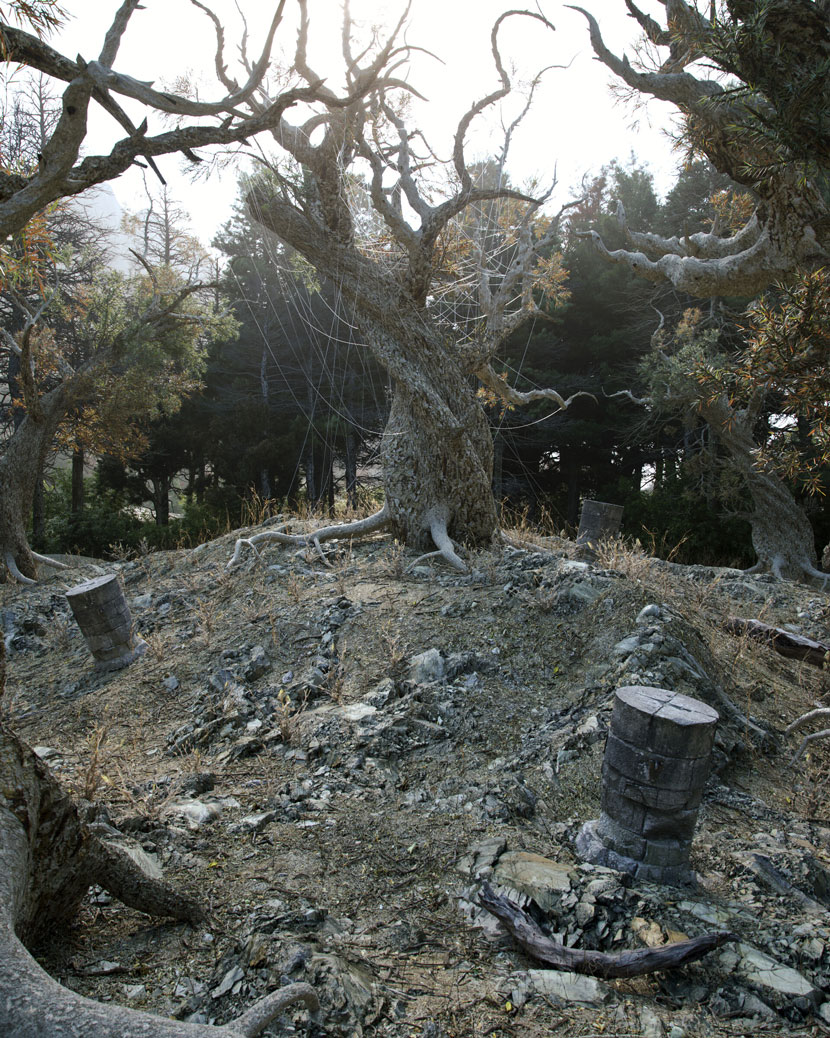 The forest is a recurring throughout Andrea’s portfolio. ‘The Witch Tree’, an ancient place of power deep within the woods, is a more fantastical depiction.
The forest is a recurring throughout Andrea’s portfolio. ‘The Witch Tree’, an ancient place of power deep within the woods, is a more fantastical depiction.
Returning to the present, please tell us more about your current employer TECMA Solutions, your history with the company, its field of work and general philosophy.
Our business model aims to create a new way of operating in the world of real estate investments. TECMA Solutions co-invests in new property projects, with a new, high-performance business model that provides capital and knowledge to produce successful go to market strategies.
Virtual architecture is a unique art that gives life to the unbuilt. Our studio division produces photographs and virtual videos that generate unique buying experiences by combining CGI with highly skilled art direction.
We add value by understanding and harnessing emotional responses, which lie at the heart of all human decisions.
Who are your clients and target markets?
Our client base includes property developers from all over the world. Most of our clients are looking for high quality archviz CG. Creating digital architecture is our main focus – we enable buyers not only to visualize a building, but to see themselves in it.
What are your main responsibilities and daily tasks as lead CG artist?
I'm in charge of following the CG team's work, coaching team members and validating production outcomes while overseeing part of the development of works.
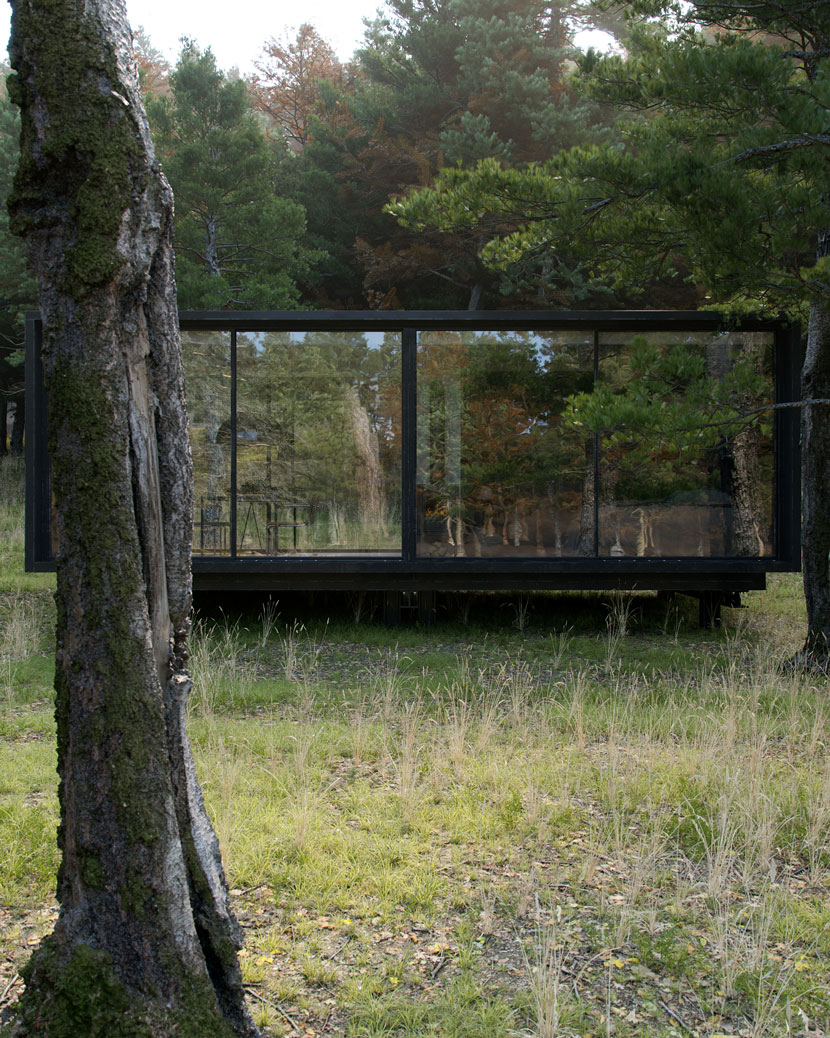 The ‘K11 House’ seems like an extension of the forest. The carefully crafted reflection in the windows adds to the impression.
The ‘K11 House’ seems like an extension of the forest. The carefully crafted reflection in the windows adds to the impression.
What is your favorite part about your job?
While I’m pretty well rounded in almost all areas of the archviz production process, what I enjoy most is look dev, composition and lighting.
Is there a specific design philosophy or architectural school of thought you adhere to? What inspires you as a 3D artist?
Usually, I start my working day by browsing various sites and blogs connected to architecture, design and photography. There are strong relations between archviz CGI and photography. My biggest inspirations include Bertrand Benoit, Jakub Cech and Alex Roman. Great artists!
Generally speaking, what is your main goal when doing architectural visualization scenes?
To reach the highest possible level of photorealism. I pay a lot of attention to composition, lighting and shading.
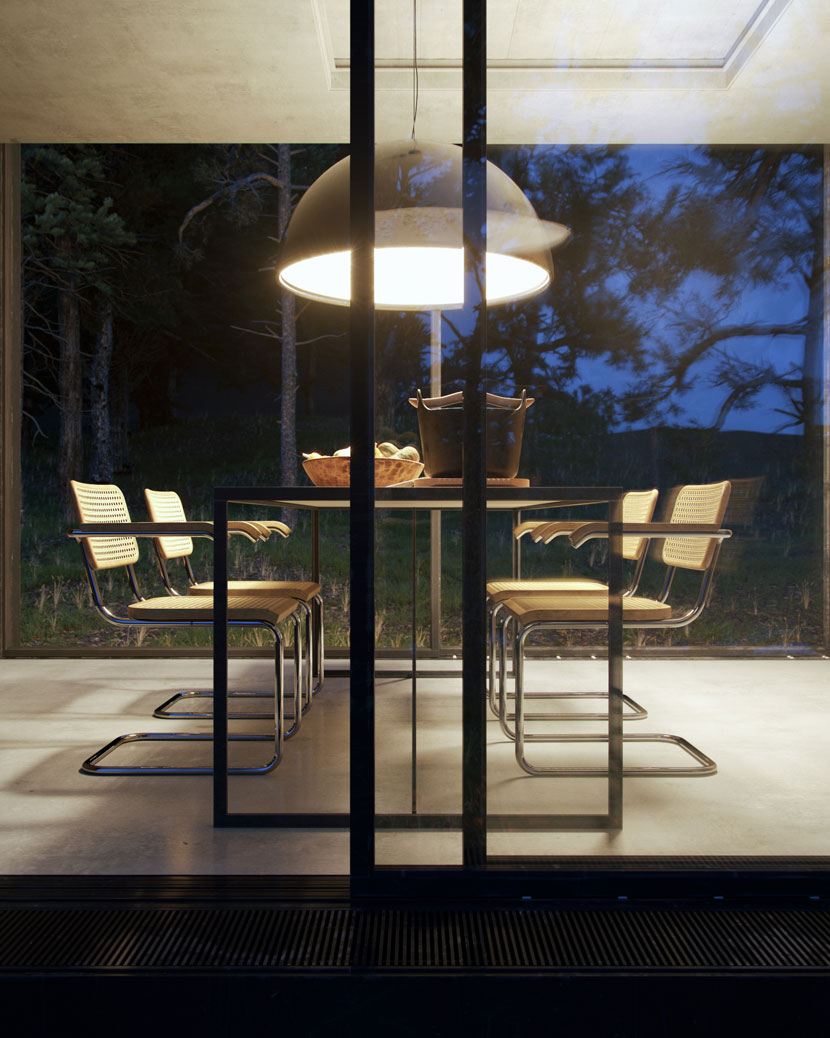 A glimpse at the interior of the ‘K11 House’.
A glimpse at the interior of the ‘K11 House’.
Now let us talk about your work in more detail, namely your submission to our campaign, the ‘K11 House’, a dedicated study in natural environments. First, please explain the name you gave this project. What does K11 stand for?
The name is purely fictional, there’s no deeper meaning to it. This was an R & D project to study how to create a photorealistic natural environment. With my focus almost exclusively on the environment, I thought a simple name for the architecture would suffice, that's all! My main goal was to push my skills in composition and overall realism.
Can you briefly walk us through the development process and tell us about the software you used?
For the most part, I try to keep it simple. My main setup consists of 3ds Max and Corona Renderer. First, I spent multiple days searching for references, ideas, and inspiration for the development of the project. Once I had a solid base, I started creating the basic volumes in 3ds Max to sketch a rough shot. Having established a foundation, I go for a second round of research for all of the detailed parts.
The trees and foliage I created using SpeedTree. Most of the textures I composed by combining assets from the SpeedTree VFX library and Quixel Megascans. I found this particular combo to be really effective. For the forest, I made good use of the references I collected earlier.
Making a natural environment look realistic requires an almost obsessive attention to detail. That’s why I create the ground with a mixture of 3d elements and 2d atlases. Almost all the assets used in this project are taken from 3D scans for the same reason.
Eventually, I converted all models in proxy and scattered them throughout the scene with Forest Pack. Post-production was done in Photoshop. As usual, the RebusFarm Farminizer plug-in worked wonders to reduce my render times!
What were some of the challenges you had to overcome?
For this type of work, where you have to recreate a complex environment rich in detail, optimization of the scene is very important. Since this was a personal project, I had a mere 32 GB of RAM at my disposal, so for this to work out, I paid close attention to the weight of every single part. This careful balancing was the only way to guarantee the success of the project in face of technical limitations.
Another challenge was making all the vegetation look natural instead of artificial: the growth of the plants had to appear uncontrolled and spontaneous. Between research, the execution phase and post-production, the project took me about eight days.
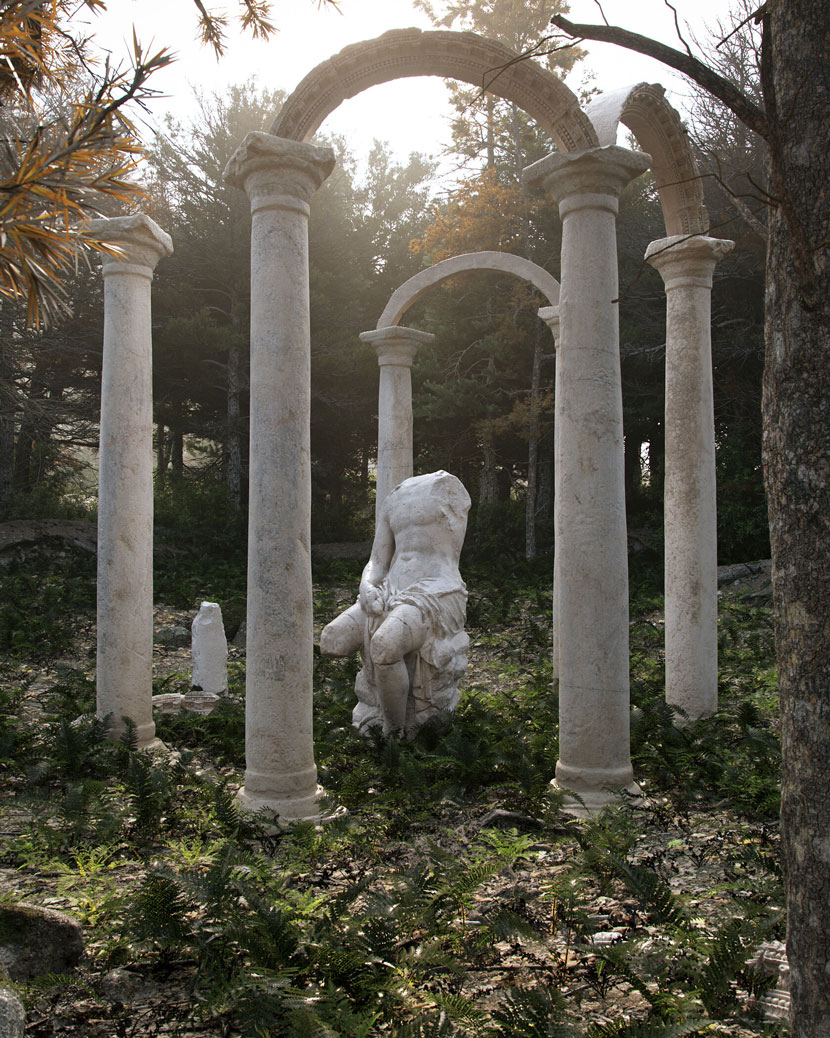 The ‘Garden of Time’, another personal project of Andrea set in the forest, follows up on his studies on natural environments.
The ‘Garden of Time’, another personal project of Andrea set in the forest, follows up on his studies on natural environments.
Why are environments important for archviz scenes and how do they influence the architecture?
The environment is absolutely vital for any archviz scene! It allows you to contextualize the building within its surroundings and to create a dialogue between the two. I wanted to emphasize this incessant mutual influence between architecture and nature. As you can see, despite being completely wrapped up in the forest, the ‘K11 House” is still very much the core of its respective scene.
When doing these personal projects, is it more of a technical exercise or about creative expression?
Personal projects are an important creative outlet for any artist to grow. When working in professional environment such as an office, it is very easy to get caught up in certain routines. Personal projects allow you to reinvent yourself by exploring new ideas, workflows and techniques, which ultimately leads to artistic growth!
Please tell us about your overall experience using RebusFarm. Is there anything you especially like about our service?
I frequently use RebusFarm for my personal as well as professional work. I found it to be one of the most reliable, cheapest and fastest render farm services I have ever used.
Andrea, thank you very much for taking the time and all the best in the future!
Keep up with Andrea Sguanci and his work here:
How to join ArtWanted!
You want to get featured in our ArtWanted! campaign and win 250 RenderPoints on top? Submit your work, rendered at RebusFarm, to 이 이메일 주소가 스팸봇으로부터 보호됩니다. 확인하려면 자바스크립트 활성화가 필요합니다.! Visit our Art Wanted! page for more information.
>> Read more articles on our blog
